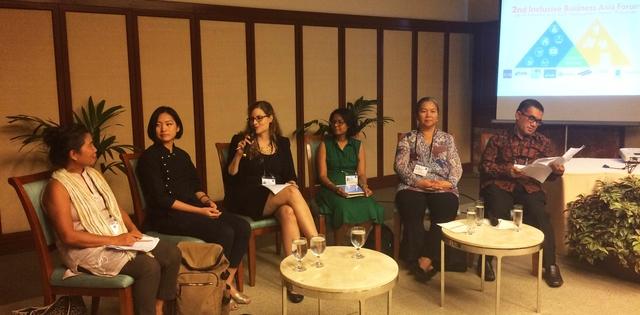Boosting Inclusive Tourism in SEA: Four Takeaways from Manila
As we are following up on the ideas sparked at the Inclusive Business Forum in Manila, it is time to take stock of the many inspiring discussions that took place last week. We were thrilled to have such a diverse panel at our session on Unlocking the Potential of Inclusive Tourism that allowed for the sharing of perspectives from the Philippines, Indonesia, Thailand and even Sri Lanka. The panel provided us with lots of food for thought. Here are my four main takeaways:
1. Include local communities from day one
This was something that all panellists agreed on. For tourism to have positive and sustainable development effects for the region the local population should be consulted with and included as early as possible. In the case of Jetwing Hotels in Sri Lanka, this meant informing the local population about the potentials and challenges of tourism and exploring together with them how they can benefit. “You have to look at them as your partner and show them the importance of their role in the industry” explained Ms. Angie Samuel of Jetwing Hotels. Of course, such engagement comes with a price tag. At Jetwing Hotels for example, their youth development program trained 550 youth, of which 50% have been absorbed by their hotels. Nevertheless, she ascertains that through measures like these, the triple bottom line of their business model has to come together. Ms. Mariglo Laririt from Ten Knots, Philippines, draws a similar conclusion, saying that “in the end your financial viability also depends on your employees, who you need to view as your partners and not just as your employees.”
2. Solid impact measurement is critical to achieving the triple-bottom line - and awards and certification schemes can help with this
Good intentions are the point of departure, but only solid measurement will allow inclusive businesses to capture their results and prove that inclusive tourism makes commercial and development sense. While impact measurement can be expensive, there is a vast international support system that can help. For example, awards and certification schemes like the Wild Asia or PATA awards can help enterprises understand their business better and track progress over time. Ms. Laririt from Ten Knots described that when the El Nido resort joined the Tourism for Tomorrow Awards in 2007, they had 72% local employees, and purchased 15-20% of supplies locally. By 2013, these numbers had increased to 90% of local employment and 50-65% of locally-sourced supplies.
3. Never stop asking “What more can we do and who can help?”
Tourism value chains are long and complex and there are manifold entry points for inclusive business models. “Every morning I get up and think: what more can I do to make a difference?” explained Ms. Vicky Sandidge from Bohol Bee Farm. This attitude has led to the growth and diversification of Bohol Bee Farm from door-to-door honey sales to a group comprising restaurants, hotel, a farm shop and even their own ice-cream brand. Individual champions, people that never seize to look for improvement and new opportunities seem to be critical to the success of inclusive tourism enterprises. This entrepreneurial spirit can also help in finding the right partners for your business. Ms. Noon Pakavaleetorn from Local Alike, Thailand, described how they have been strategically partnering with tourism companies to grow their grassroots community-based tourism platform. Jetwing Hotels has also partnered with various organisations like IFC, ILO or GIZ on some of their social development programmes.
For some more inspiration, check out our practical guide on making the most of IB opportunities along the tourism value chains, Destination Mutual Benefit (accessible online).
4. Systemic change hinges on the right enabling environment and governments have a crucial role to play
Having a government representative on the panel, the discussion on the role of government in promoting and facilitating Inclusive Tourism was particularly interesting. There was consensus that governments can help in providing infrastructure, market access and capacity building, especially for smaller enterprises. Mr. Frans Teguh also emphasised the necessity of building Inclusive Tourism ecosystems that create linkages and support beyond the core tourism industry, to include agriculture and other local supply chains, as is envisioned in the Inclusive Tourism strategy of the government of Indonesia. Such comprehensive strategies have the potential to really boost the inclusive tourism agenda. The other panellists agreed, but also called on governments to fulfil their roles as the providers of basic services in the areas they operate in. Panellists pointed to the lack of appropriate health care and education in the communities they operate in and regret that these shortcomings keep them from working on other topics: “We love to be inclusive, but we could do so much more if others fulfil their role as well.”
A final thought concerns the potential for scale of inclusive tourism business, especially of smaller enterprises working on community-based tourism. This is a discussion we keep on having, which is a good thing, inspiring mutual exchange and the design of new support mechanisms. Yet, a strong focus is still placed on looking for those bankable, scalable, high-growth and high-impact enterprises, when in reality, like in many other sectors, these are few and far between. We should not underestimate the importance of pioneers for replication and starting a movement. Innovations often start small. This can also inspire consumers and trigger systemic change from the demand-side. To end with a quote of Ms. Mariglo: “The key is to find the champions, work with an optimum number of people to get the engine running.”
Photo: From left to right: Angie Samuel from Jetwing Hotels, Sri Lanka; Noon Pakavaleetorn from Local Alike, Thailand; Sarah Schwepcke from GIZ, Indonesia; Mariglo Laririt from Ten Knots, Philippines; Vicky Sandidge from Bohol Bee Farm, Philippines and Dr. Frans Teguh from the Ministry of Tourism, Republic of Indonesia. (Photo credits: Rappler)
